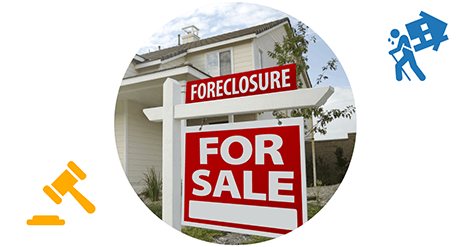Frequently Asked Questions About the Foreclosure Process

Foreclosure investing can come with a lot of questions and not always a lot of clear answers. Here are a few of the most common FAQs the PropertyRadar team gets around the foreclosure process.
Find foreclosure opportunities using public records with PropertyRadar’s free trial.
Foreclosure Process FAQ
A property went back to the bank, can I contact the bank directly to purchase the property?
Although it is possible to purchase directly from the lender prior to them listing the property, it is rare and very difficult. In most cases, the lender assigns the property to an asset manager who performs the occupancy check, assesses the condition of the property, prepares it for sale, and orders a BPO/Appraisal to determine fair market value. The bank then lists the property and takes offers.
To successfully purchase a property from a lender prior to the sale, you must find a decision-maker with the lender, that has the authority to enter into a purchase agreement prior to listing the property.
The trustee has not returned my overbid (that I need), what is my recourse?
We are not aware of a clearly defined time limit on the return of any overage. You could contact them daily, and escalate your request to a manager if you are not getting a response.
I haven't received the Trustees Deed, can I speed things up?
If you have waited several days after the auction sale where you were a winning bidder and the Trustee has not delivered the Trustee's Deed, you can call the Trustee. You may need to be persistent, even calling daily, for a status check on the Trustees Deed. You may also want to remind them that California law requires that the deed be recorded within 14 days of the sale, to be effective, as of 8 am the date of sale.
What are my rights as an auction winner if the former owner is filing a lawsuit against the lender for illegal foreclosure?
It will depend on various factors, depending on your specific situation.
If they have a valid reason to fight the foreclosure, then you may want to work with them to get the sale rescinded, and get your money back as quickly as possible. Otherwise, if they do actually file a lawsuit, you will need to hire an attorney, though you could let the lender's attorney take the lead to minimize your expenses.
Do I have to refund a tenant's security deposit?
You are not obligated to refund the security deposit. The tenants can pursue collection of the security deposit from the prior owner, in small claims court.
Often it can be easier to offer a cash-for-keys incentive, to negotiate a move-out date (typically faster than waiting the 90 days). This allows them the funds to move, since it may take time for them to get their deposit back from the prior owner.
I won a property at auction, what are my legal obligations for rental/leasing tenants?
Under the Protecting Tenants in Foreclosure Act, you are obligated to give a renter 90 days' notice if they are renting on a month-to-month tenancy; or honor the terms of the lease, provided it is a valid lease, with fair market rents, and signed prior to the Notice of Default. If the renter fails to pay, under the terms of that lease, then you would have the right to evict them with three-day notice, for failure to pay.
I won a property at auction, can I give the occupants a three-day notice right away?
Provided the Trustees Deed is recorded within 14 days of the sale, the effective date of your ownership is on the date of the sale. Many investors make contact with occupants right away but wait until the Trustees Deed is recorded to serve a 3-day notice.
I won a property at auction, how soon can I change the locks if the property is vacant?
If the property is vacant, you can change the locks right away, and take possession of the property.
Why would lenders post an opening bid substantially higher than the property value?
The lender can discount the opening bid, or add the accrued interest on the loan to the published bid. It is impossible to know for sure which lenders will discount the opening bid. Often the lender is the servicer of the loan for another investor, and the opening bid is set by the actual investor. There could also be additional interests involved, such as the existence of a mortgage insurance policy, which may cause the lender to set the opening bid at the full amount owed on the loan.
How can I get opening bids even faster?
The lender gets to make the first bid, which is the Opening Bid. Some also refer to it as the drop bid, because lenders may substantially discount the opening bid from the amount owed. The laws regarding opening bids vary from state to state. In California, the lender/trustee is under no legal obligation to announce the opening bid in advance of the sale. They typically release the opening bid the day before or the morning of the sale. Sometimes the bid is not announced until the sale starts.
The Research Team at PropertyRadar works diligently to post opening bids as quickly as possible. You can set Alerts so that we automatically update you when Opening Bids are published in PropertyRadar.
PropertyRadar also provides the trustee's name, phone number, and Trustee Sale number so that you can manually call the trustee for last-minute information.
What are the holidays observed for auction sales?
Trustee Sale Auctions do not occur on Federal, State, and some County holidays. Some locations may close for a half-day on other holidays, such as Good Friday.
You may want to verify with your bank to confirm their holiday and office hours to be sure you have your funds in order.
What is the difference between an opening bid and the published bid?
The Published Bid is the estimated opening bid published in the Notice of Trustee Sale. The Opening Bid is the actual amount at which the lender plans to, or did, start the bidding at auction.
See our Glossary Terms for additional definitions.
What do I take with me to bid at a trustee sale auction?
To bid in California, you need to qualify. In most states, qualifying requires showing the auctioneer your identification, and cash or a cashier's check sufficient to cover the full amount you wish to bid.
Most investors take cashier's checks made out to themselves. This way, if you are not the winning bidder, you can easily redeposit the funds. And if you are the winning bidder, you can endorse the check over to the trustee. However, trustees can have their own payment requirements.
Want to learn more about the foreclosure investing process?
|
Check Out The Complete Guide to Foreclosure Investing |


